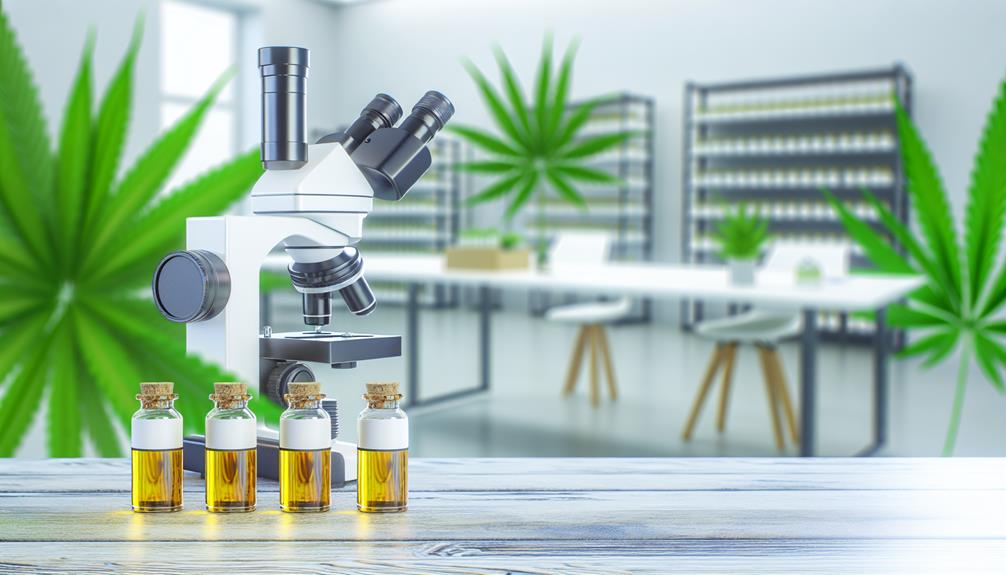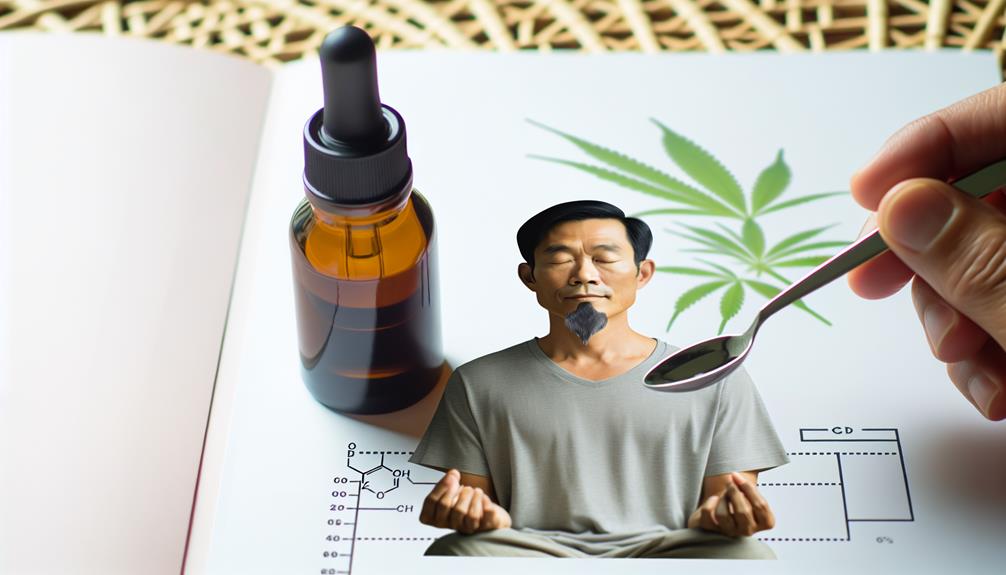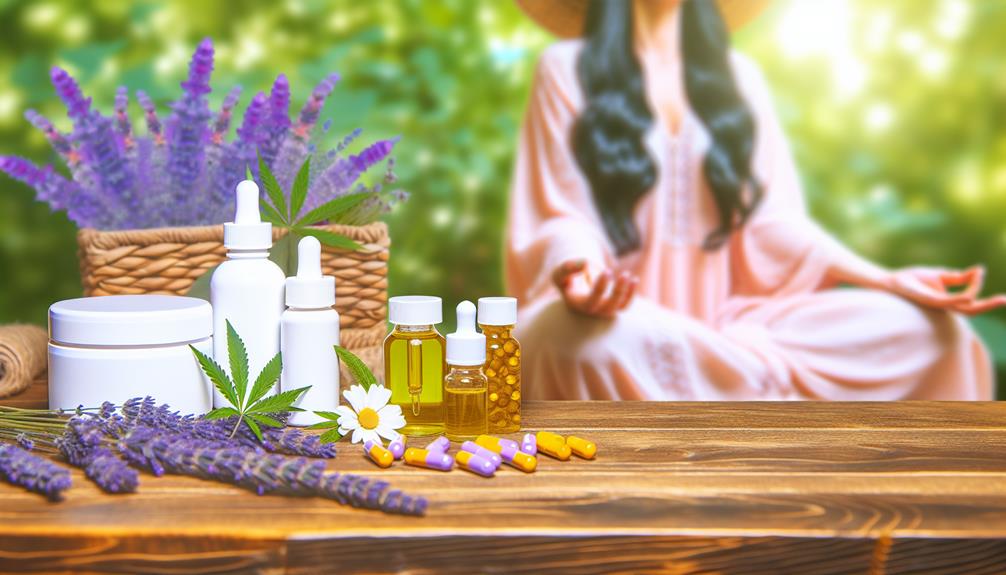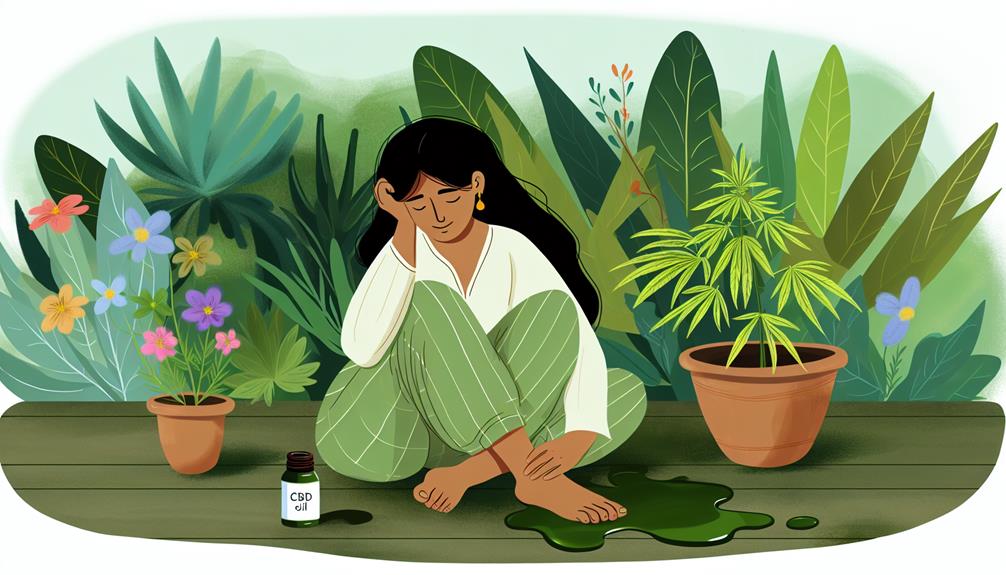In the ever-evolving landscape of wellness, you may have heard whispers of a certain green ally that promises a calmer horizon. CBD, short for cannabidiol, has quietly emerged as a potential natural combatant against the wear and tear of daily stress. As you navigate through the ebb and flow of life's demands, you might find yourself intrigued by the purported soothing effects of this plant-derived substance. While scientific studies have begun to shine a light on CBD's relationship with stress relief, it's crucial to arm yourself with knowledge before integrating it into your routine. You're likely curious about how this compound works in tandem with your body's intricate systems to potentially ease the burdens of anxiety. Stick with us as we explore the calming waters of CBD, and consider whether it's the anchor you've been seeking in the tumultuous sea of stress management.
Key Takeaways
- CBD taps into the endocannabinoid system and can alter serotonin signals, which regulates mood.
- CBD has been shown to significantly lower the stress response and reduce anxiety levels.
- Chamomile extract therapy and lavender essential oil have scientific backing in reducing anxiety symptoms.
- Dosage is personalized, and finding the right balance is crucial.
Understanding CBD
While CBD is renowned for its calming effects, it's important to grasp how it interacts with your body's receptors to potentially ease anxiety symptoms. CBD products tap into the endocannabinoid system, which plays a crucial role in maintaining your health and wellness. This system, consisting of CB1 and CB2 receptors, regulates various bodily functions, including mood. By influencing these receptors, CBD can alter serotonin signals, a key neurotransmitter linked to feelings of well-being and happiness.
Research supports that CBD has a positive impact on anxiety, with more than half of U.S. adults turning to it for relief. Unlike traditional SSRIs (selective serotonin reuptake inhibitors) prescribed for anxiety, CBD offers an alternative approach. It's not a one-size-fits-all solution, though. The form in which you take CBD matters; vaping or smoking it can yield quicker, more potent effects compared to edibles, which have a delayed onset.
But before you dive into using CBD, you should consult with a medical professional experienced in cannabis administration. This isn't just about playing it safe; it's about tailoring the treatment to your needs. And when it comes to dosage, more isn't always better. Finding the right amount is key to managing your anxiety effectively with CBD.
CBD's Stress-Relief Potential
Exploring CBD's potential, research has consistently highlighted its effectiveness in dialing down the stress response, offering a beacon of relief for those grappling with anxiety. You may have heard claims about CBD's stress-relief potential and wondered if it's all hype. Well, the evidence is mounting that CBD, a non-psychoactive compound found in cannabis, may indeed reduce stress and alleviate symptoms associated with anxiety disorders.
Clinical trials have shown that CBD can significantly lower the stress response. This is crucial because when you're stressed, your body's cortisol levels rise, leading to various health issues. By modulating this response, CBD helps to maintain balance in your system, potentially making you feel more at ease.
Moreover, CBD has been specifically acknowledged for its positive effects on anxiety. For instance, in a small 2011 trial, participants with generalized social anxiety disorder experienced a significant reduction in anxiety levels after taking CBD. This suggests that for those moments when you're feeling particularly anxious, a dose of CBD might just be the natural solution you're seeking.
If you're struggling with generalized anxiety or the discomfort that comes with it, CBD might offer some comfort. Its ability to ease the mind without causing the high associated with THC makes it an appealing option for many.
Scientific Research Findings

Building on the promise of CBD for stress relief, recent scientific research has uncovered additional natural therapies that may also help to alleviate anxiety symptoms. For instance, chamomile extract therapy, a natural remedy long-touted for its calming properties, now has scientific backing. Research suggests that regularly consuming chamomile can significantly reduce anxiety symptoms. It's a gentle approach that might complement the effects of CBD, offering a dual strategy for managing stress.
In the realm of aromatic therapies, lavender essential oil is another standout. Clinical trials demonstrate that lavender's soothing scent may have tangible benefits for those with anxiety disorders. When used as part of an aromatherapy routine, it can create a serene environment, conducive to relaxation and mental clarity.
But let's not forget the body's role in stress management. Exercise, specifically vigorous-intensity workouts, not only improves overall physical health but also aids in smoking cessation, particularly for those with high anxiety sensitivity. This suggests a powerful link between physical exertion and anxiety control, where engaging in activities like running or cycling can offer a natural stress release.
Moreover, the incorporation of yoga and meditation into your daily routine can have profound effects on both depression and anxiety. These practices center the mind and body, fostering a sense of calm that can mitigate the chaos of stress.
How CBD Interacts With Stress
Delving into how CBD affects stress, it's essential to understand that it interacts with the body's endocannabinoid system, potentially tweaking serotonin signals to alleviate anxiety. This system plays a pivotal role in maintaining balance across various bodily functions, including mood regulation and stress response. When you use CBD, it may enhance the efficiency of your central nervous system's ability to handle stress, which can, in turn, reduce anxiety.
CBD's interaction with the receptors in the endocannabinoid system might also influence cortisol levels, which are often referred to as the "stress hormone." By potentially modulating these levels, CBD could offer a natural approach to managing the physiological aspects of stress.
Here's a closer look at the potential benefits of CBD for stress:
- Interacts with CB1 and CB2 receptors: These are located throughout the central nervous system and may help modulate mood and anxiety.
- Modifies serotonin signals: Low serotonin is linked to anxiety; CBD could offer a natural alternative to serotonin-boosting medications.
- Reduces cortisol levels: By potentially lowering the production of cortisol, CBD might help manage the body's stress response.
- Supported by user reports: Over half of CBD users in the U.S. report using it to alleviate anxiety.
- Broad potential for anxiety disorders: Individuals with various anxiety disorders may experience reduced anxiety and discomfort with CBD usage.
It's important to remember that while many find CBD helpful, it isn't legally cleared as an anxiety relief medication. Always consult with a healthcare professional, particularly one with expertise in cannabis products, to determine if CBD is a safe and suitable treatment option for your stress and anxiety concerns.
Dosage Guidelines for CBD

When starting with CBD for stress relief, it's best to begin with a small dose and carefully adjust it based on your individual reaction and needs. Dosage is not one-size-fits-all, and finding the right balance is key to maximizing CBD's potential benefits for managing stress and anxiety.
Let's dive into the specifics. For conditions like social anxiety disorder, research has shown that a single oral dose of 600 mg CBD can significantly decrease anxiety levels. However, this high amount isn't typically necessary for everyday stress. For generalized anxiety and sleep disturbances, lower CBD doses in the range of 25-75 mg may be effective while also minimizing the risk of side effects.
Determining the optimal mg CBD for your needs is a personalized process. Start with a low dose and monitor how your body responds. If you're not experiencing the desired effects after a week or two, you might consider gradually increasing the dose. It's crucial to listen to your body and also to consult a healthcare provider, especially one who specializes in cannabis administration, to ensure you're using CBD safely and effectively.
Personal Testimonies on CBD
You've heard the science and guidelines; now it's time to hear from those who've experienced CBD's impact on stress firsthand. Real people with real stories share how this natural remedy has transformed their daily battles with anxiety. These personal testimonies can offer you a glimpse into the potential life-changing benefits CBD may hold for your own stress relief journey.
Real People, Real Stories
Countless individuals have turned to CBD, sharing stories of significant stress relief that have transformed their daily lives. You might find yourself nodding along as you hear about their battles with anxiety and depression, and the comfort they've found in CBD's natural embrace.
Here's what real people with real stories have to say:
- "CBD has been a game-changer for my anxiety," says Emily, who found solace after years of struggle.
- Mark tells of improved sleep and reduced stress levels, calling CBD his "nightly routine."
- Jennifer shares how CBD eased her chronic stress, allowing her to enjoy life's moments more fully.
- "I was skeptical, but CBD has genuinely helped my depression," reveals Tom, who's experienced a noticeable mood improvement.
- Anna credits CBD for her newfound ability to manage daily pressures with a calm mind.
Transformative Experiences With CBD
Personal stories from those who've embraced CBD reveal a common thread: transformative experiences characterized by profound stress relief and enhanced mental clarity. You've likely heard that CBD oil may help reduce anxiety, and these anecdotes offer a glimpse into just how impactful it can be.
| User Experiences | Before CBD | After CBD |
|---|---|---|
| Emily's Journey | Constant anxiety | Marked calmness |
| Mike's Tale | Overwhelming stress | Manageable daily life |
| Anna's Story | Sleepless nights | Restful slumber |
| Dave's Reflections | Mental fog | Sharper focus |
| Leah's Accounts | Panic attacks | Significant relief |
Each row in this table represents a life significantly changed. These individuals found CBD to be a key player in their quest to help with anxiety and manage life's stresses. Engage with their stories, and you may find the hope you're seeking for your own relief.
Comparing CBD Products

When you're comparing CBD products, it's crucial to understand the different types of formulations available. You'll want to consider both potency and dosage to match your stress relief needs, as these can greatly influence effectiveness. Keep in mind the distinct effects of full-spectrum products compared to isolates to make an informed choice that best suits your lifestyle.
Types of CBD Formulations
Exploring the diverse landscape of CBD formulations, you'll find capsules, tinctures, topicals, and more, each tailored to meet specific wellness needs such as stress relief. These different forms offer unique benefits, and understanding their distinctions can help you select the right one for your lifestyle and preferences.
- Capsules: Convenient and precise dosing, with formulations for stress, sleep, and more.
- Tinctures: Full Spectrum CBD droppers allow for versatile use and easy potency adjustments.
- Topicals: Roll-ons and Pure CBD-Freeze provide targeted relief to sore areas.
- CBD Gummies: Tasty and discreet, perfect for on-the-go stress management.
- Organic Full Spectrum: Offers the full benefits of hemp with all cannabinoids intact, promoting the entourage effect.
Each option presents a way to incorporate CBD into your stress relief regimen, with the potential for natural support.
Potency and Dosage Considerations
Understanding the potency and dosage of CBD products is essential in customizing your stress relief strategy to your individual needs. When you're comparing CBD products, it's important to consider both the mg per serving and the overall potency. Potency and dosage considerations can make a significant difference in how effective CBD is for managing your stress. Remember, CBD's efficacy often follows an inverted U-shaped dose-response curve, meaning there's an optimal dose that provides the best results; too little or too much may be less effective.
Full-Spectrum Vs. Isolate Effects
Let's delve into the distinct effects of full-spectrum and isolate CBD products, as your choice can greatly influence the efficacy of your stress relief regimen. Understanding the differences between these two can help you tailor your approach to relieve anxiety.
- Full-Spectrum CBD: Harnesses an entourage effect, potentially offering more comprehensive benefits due to the presence of various cannabinoids and terpenes.
- Isolate CBD: Provides a pure cannabidiol experience, ideal for those who need to avoid THC or other cannabinoids.
- Entourage Effect: Full-spectrum products may enhance therapeutic outcomes, promoting a synergistic impact on stress.
- THC Sensitivity: Choosing isolate ensures you avoid THC, which is critical for certain jobs or personal preferences.
- Targeted Effects: Isolate allows for more controlled studies and understanding of CBD's specific effects on stress.
Potential Side Effects

While CBD is often celebrated for its stress-relief benefits, it's important to recognize that some individuals may encounter side effects such as fatigue, appetite changes, and digestive issues. Though CBD is generally considered safe, your body may react differently, and it's essential to be mindful of how you feel after use.
You might notice changes in your appetite or weight. Some experience an increase in hunger, while others find their appetite suppressed. Weight fluctuations can follow as a direct consequence of these changes. If you're trying to maintain or alter your weight, keep a close eye on your eating habits while using CBD.
Fatigue is another common side effect. CBD is known for its calming effects, which is great for stress, but it might leave you feeling a bit too relaxed at times. If you find yourself feeling unusually tired after taking CBD, you might need to adjust your dosage or the time of day you take it.
Diarrhea and other digestive issues can also occur. These adverse effects are typically mild and temporary, but if they persist, it's wise to consult with a healthcare professional. They can help determine whether CBD is the cause and advise on the appropriate action to take.
Rarely, some users report an increased heart rate after taking CBD. This can be unsettling, especially if you're using CBD to manage stress. If you experience this or any other concerning symptoms, it's crucial to stop using CBD and seek medical advice.
Frequently Asked Questions
What Is the 3 3 3 Rule Anxiety?
The 3 3 3 rule for anxiety is a mindfulness practice that helps you manage anxiety triggers. You'll focus on spotting three things you can see, hear, and touch, which redirects your attention from stress to your environment. It's like a breathing technique for your senses, calming your mind by anchoring you in the now. Regularly using this method can sharpen your ability to stay present and reduce anxious feelings.
How Quickly Does CBD Calm Anxiety?
You'll feel like you've hit the anxiety-busting jackpot! CBD mechanisms kick into high gear, with some anxiety studies showing relief could start within a lightning-fast 15-30 minutes. The secret? It's all in the dosage timing. Sublingual oils might speed up the zen train, but even edibles join the party eventually. Stay consistent, and you'll find those waves of calm washing over you, potentially lasting a few blissful hours.
How Much CBD Should I Take to Relieve Stress?
You're wondering how much CBD you should take to ease stress. It's crucial to consider dosage factors like your body's response and tolerance. Administration methods also play a role; vaping might hit faster than edibles. Start low, gauge your reaction, and you can safely increase the amount. Remember, it's always wise to talk to a healthcare professional, especially one knowledgeable about cannabis, to nail down the best dosage for your needs.
What Is a Natural Alternative for Cbd?
You're seeking natural alternatives to CBD for stress relief, and you have plenty of options. Consider herbal adaptogens like ashwagandha for balancing your body's stress response. Explore aromatherapy benefits with essential oils that promote relaxation, such as lavender. Also, delve into mindfulness techniques, including meditation and deep-breathing exercises, to manage anxiety effectively. These methods can enhance your well-being without relying on CBD.
